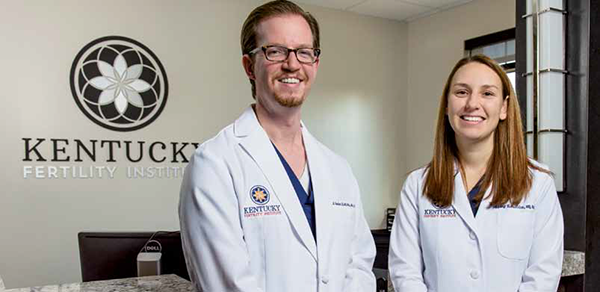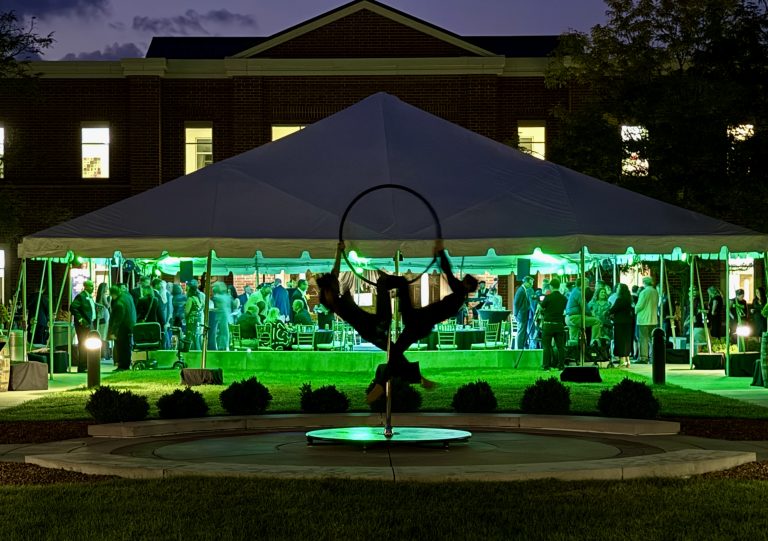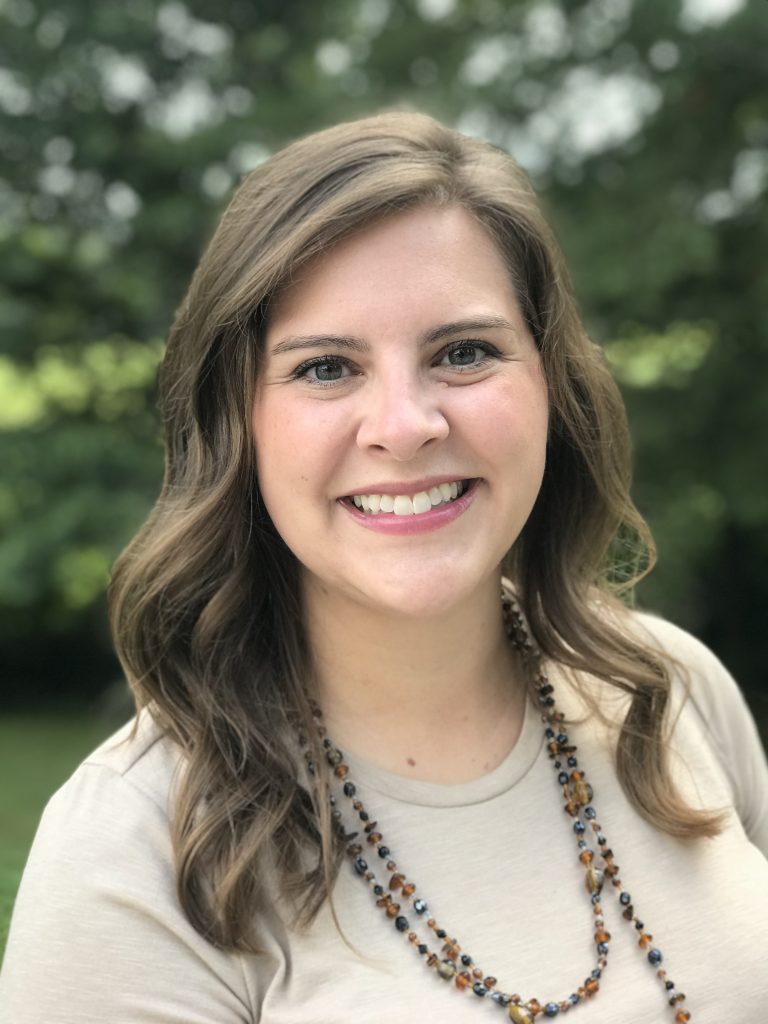
Providing the most modern infertility care in Kentucky and Southern Indiana
The subject of infertility can be one of the most sensitive issues for men and women of reproductive age.
Because so much of both men’s and women’s self-worth is tied up in their successful procreation of children, frank conversations about what the problem might be, or what the solutions could be, are too often shrouded in anger, accusations and embarrassment.
Not only do couples have trouble discussing it calmly with one another, they frequently have trouble seeking help from their support group: parents, siblings, friends, medical providers, even religious leaders.
“Studies show that the psychological impact of a diagnosis of infertility can be equivalent to a diagnosis of cancer,” said Robert Hunter, M.D., a Louisville-based reproductive endocrinologist and infertility specialist. “It can be really devastating to accept that this dream you’ve always had may be in jeopardy.”
Early this year, Hunter and fellow reproductive endocrinologist Tiffany Justice, M.D., opened the Kentucky Fertility Institute to offer a comfortable – and comforting – solution-based setting for couples who are frustrated by their lack of success as well as couples who know they have fertility issues but don’t know what to do about it.
“Everyone who comes in is apprehensive,” said Justice, “and we have to first treat the emotional aspects. At the end of every appointment, I write every patient’s treatment plan down, step by step, so they have a paper to go home with, to review at their leisure once they get home.”
The plan is comforting because it helps take the uncertainty out of the process. “Too often, in the past, people were told to go home and just keep trying, it will happen,” she said. “That’s dismissive and not very encouraging.”
“Just the view of seeing their treatment plan is so comforting to patients,” agreed Hunter. “They also know we’ll hold their hands every step of the way, be their advocate and their cheerleader.”
Often, Justice said, there are no reasons for the couple’s lack of success and a little patience and more trying really are what’s called for. And sometimes, she said, “we can help just by tweaking the natural cycle, adding supportive hormones and medications to make things physiologically more compatible for pregnancy.”
Guidelines show that if a woman is younger than 35 with normal menstrual cycles, there’s an 85 percent chance she’ll get pregnant naturally within a year with routine, well-timed intercourse.
“Sometimes, we just have to tell them, ‘You’re normal, nothing is wrong, let’s give it time. The more I mess with you is not a good idea,’ ” said Justice. “I show them the data and explain the menstrual cycle. I advise, ‘If you’re normal, let it be normal.’ ”
But to think that most people who’ve been unsuccessful are unnecessarily impatient or can become successful just by turning down the stress levels is unrealistic. A 25-year-old woman without a normal menstrual cycle is well-advised to come in – at least for a conversation.
“We commonly see patients who’ve been trying unsuccessfully for one or more years,” Hunter said. “They want more than reassurance – they want help.”
And help is what Kentucky Fertility Institute offers, starting with a calm and informative one-hour introductory conversation. Then, a series of tests are administered, including bloodwork and an ultrasound, to find possible causes of infertility.
“There are several common reasons for infertility,” said Hunter, “and, roughly, they’re equally distributed between male and female issues.”
The male may have an abnormally low sperm count or low sperm motility. (The sperm don’t swim through the female reproductive tract.) Causes for this can vary. It could be a genetic defect, or the result of illness, lifestyle or previous medical treatment.
Smoking, medication, high levels of stress, hormonal issues, certain medical procedures, like cancer therapy, all might contribute to sperm deficiency.
The female might not be ovulating regularly, or might have other medical or endocrine issues that interfere with ovulation. For her, too, medications, smoking or obesity could all disrupt normal ovarian functions. In addition, previous abdominal or pelvic surgery (including appendectomy, gall bladder surgery, or treatment of a miscarriage) might have left scar tissue that can affect future pregnancies.
And then there’s age. “As women move through their mid- to late-30s and early-40s, there’s a natural decline in fertility, even for women who previously were fertile,” said Hunter. And there are other reasons, as well. The fact is, fertility issues are not rare. “Infertility affects about 15 percent of all couples,” said Hunter.
“Statistically, that’s close to 100,000 couples in Kentucky alone.”
Regardless of the cause, a number of treatment options are available. In some cases, it may be advising one or both parties to stop smoking, lose weight, or otherwise improve their overall medical condition.
In some cases, it might involve augmenting the female’s ovarian function with medical treatments to increase the chance of fertilization occurring.
For men with low sperm parameters, an intrauterine insemination (IUI) – taking a sperm specimen, concentrating it and placing high numbers of motile sperm cells directly into the woman’s uterus – will increase the sperm’s ability to fertilize the egg. “We use a small catheter to gently place the cells into the uterus,” Hunter explained. “For the woman, it’s more or less like getting a Pap smear.”
Sometimes, surgery might be required to repair issues with the woman’s reproductive organs – such as removing mechanical obstructions in the fallopian tube or reversing a previous tubal ligation. Hunter and Justice perform all of their own surgeries, either on-site at their center or at Louisville-area hospitals.
The final option, of course, is in-vitro fertilization (IVF), in which eggs are removed from the woman’s ovary, fertilized and then placed back in her uterus. The state of the technology has improved so much over the years, said Hunter, that “in the most favorable cases, success rates for IVF can exceed 70 percent per treatment cycle.”
And, since only one embryo needs to be transferred, it reduces the risk of multiple pregnancy, with which fertility treatments were so often identified years ago.
There are other exciting developments in the field, as well. DNA-screening of embryos can help head off certain congenital conditions, like cystic fibrosis or Huntington Disease.
For women who are reproductively healthy but are interested in delaying pregnancy while they pursue their education or career, KFI offers elective egg freezing. “It’s essentially a mini-IVF procedure that freezes a young woman’s eggs prior to fertilization, keeping them as insurance for the time in the future when she’s ready to start a family, giving her a higher chance of conception,” Hunter said.
KFI also offer a full spectrum of third-party reproduction options for patients who are not able to use their own eggs or sperm, or may require a gestational surrogate.
“Third-party reproduction is a wonderful option that has given many patients the opportunity to grow their families who otherwise would not have had any viable options,” Hunter said, “It’s also a great solution for same-sex couples who want to have children.”
Even when an individual has been diagnosed with cancer and is facing treatment that will harm his or her chances of fertility, KFI can freeze the sperm or eggs, in a procedure referred to as “onco-fertility.”
“If we can have two weeks to put a woman through a fertility preservation cycle before she starts her cancer therapy, we can often save her ability to have children in the future,” said Hunter. “Even when cancer affects reproductive organs, there are ways to help these couple have genetic children.”
Hunter said he and Justice were motivated to open the Kentucky Fertility Institute because there had been no comparable facility in the state of Kentucky before. “We’re the only center in the area with a full-time, on-site lab director, so we’re able to provide continuous, comprehensive services in a way no other center in state is able to right now,” he said. Previously, people had to drive to Cincinnati, Indianapolis or Nashville for comparable services.
“And,” said Justice, “since so many of these treatments involve multiple visits per week, that became a considerable inconvenience.”
The institute is located near the intersection of the Gene Snyder Freeway and I-71, so with the completion of the East End Bridge, it will be conveniently accessible to residents of Southern Indiana, as well as the counties of Kentucky.
“We’re quickly becoming a destination center for comprehensive fertility care, and we’ve already seen patients from all over the region,” Hunter said.
How have the outcomes been? Since KFI has been open only seven months, it’s too soon for its patients’ babies to have been delivered. But Justice said, “We’ve already had close to 100 patients who have been released to back their obstetrician with a clinical pregnancy. I can’t tell you how great it makes you feel when you hear the good news that a patient checked her pregnancy test at home and it’s positive. After her husband and parents, we’re often the third call she makes.”
Kentucky Fertility Institute
4612 Chamberlain Lane
Ste. 200
Louisville
502.996.4480
*The initial hour-long visit is $50
*This is an advertorial



















